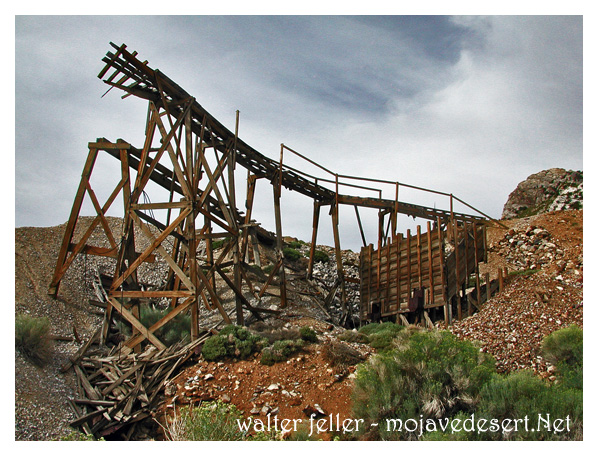Inyo County Mining History

Inyo
is the second largest county in California, with 10,135 square miles of area. The highest (Mt. Whitney) and lowest
(Badwater)
elevations in the continental United States are located here. Inyo's recorded mineral production has been more than $150,000,000 worth of silver, lead, zinc, copper, gold, tungsten, talc, borax and soda products. Several of the major gold producing areas (Reward,
Skidoo
and the
Keane Wonder Mine)
and most of the tungsten mines (located near Bishop) lie outside the California Desert Conservation Area under study and are not mentioned herein.
Inyo County owes much of its development to a single incident that occurred in the winter of 1849-1850. Approximately one hundred impatient emigrants, drawn west as part of the great California gold rush, found themselves trying to escape Death Valley after having attempted a "shortcut" to Sacramento.1
These visitors, the first white men, women and children to visit this area, split up upon entering
Death Valley
into several different groups, each searching for a way around the
Panamints
and on to Sacramento or Los Angeles. They burned their wagons, slaughtered their oxen for food, and jettisoned everything not essential for survival. Water was as valuable to them as gold or silver.
In their search for the precious water, scouts found silver. Turner and Martin, young silver miners from Georgia, found a chunk of black rock containing 50 percent silver. They told scattered groups whom they met up with at camps in the Panamints of their find. No one then cared much about wealth. Turner carried a small sample out with him, later having a gunsight fashioned out of it.2
This silver discovery, known as the Lost Gunsight Mine, soon created a rush of it's own, and became a major incentive in the exploration and development of Inyo County. Inyo County's mining history is best related in terms of "looking for the Lost Gunsight".
Discouraged by the northern gold fields, Turner returned to Death Valley in May, 1850, to look for his silver mine. Unsuccessful, he solicited financial help from a
Dr. E. Darwin French. The
two returned to Death Valley without finding the mine. A third trip was planned, but aborted after snows set in the Panamints.3
Turner apparently gave up his search shortly thereafter and Dr. French moved to Oroville in the mid 1850s. The Lost Gunsight Mine was temporarily forgotten until the Comstock Lode of Nevada generated a rush for silver throughout the Great Basin. Miners from Mexico began exploring the California Desert during 1859-1 860, in an attempt to discover the vein that surely extended from the silver mines of Mexico to the Comstock itself. Dr. French returned to Death Valley in March, 1860, as a guide for the Butte Mining and Exploring Company. Excited by the chance at discovering a second Comstock, French's expedition was anxious, diligent and successful, not in finding the Lost Gunsight Mine, but gold, which developed into Coso.4
By permission
Russ Harthill
Coso
Cerro Gordo
Tecopa
Panamint
Darwin
Lost Gunsight Legend
Gold in Inyo County
Ryan
Greenwater
Tecopa (20th Century)
Gold (20th Century)
Non-metallic Minerals